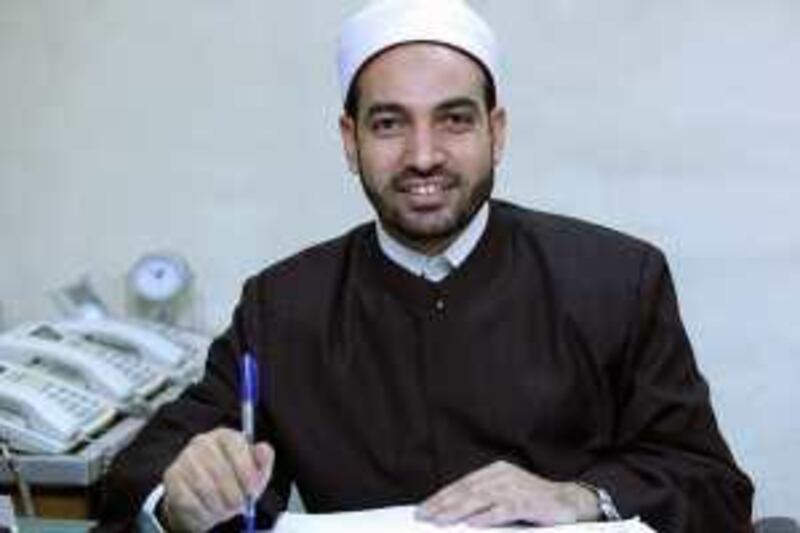CAIRO // A new television channel named after the Sunni Muslim world's most respected institute of learning is to be launched this summer in an attempt to fight "extremist" channels and regain the stature of Al Azhar and moderate Islam. "Azhari channel is to revive the role of Al Azhar which has been, unfortunately, taken away by extremist satellite channels that have mushroomed in recent years and claim to have a monopoly on talking about Islam," said Sheikh Salem Abdel Gelil, 42, the head of the new channel.
"As a matter of fact, Al Azhar has waited too long to have a channel that represents its moderate thought and speaks in its name," he said. Al Azhar is the highest seat of Sunni Islam and the mosque and adjacent university were built more than 1,000 years ago, in the heart of Cairo. The Azhari channel will launch by mid-August to coincide with Ramadan, when TV viewing is at its highest in the Arab and Muslim world.
Azhari does not receive any financial support from it. It is funded by Hassan Tatanaki, a Libyan businessman, Yehia al Bostani, a businessman from Egypt, and a popular, albeit controversial Egyptian cleric named Khaled al Gendy, who is also the chairman of the board. "I have been thinking about having such a channel for years, but the three of us decided on the idea a month ago, while we were attending the wedding of the daughter of Hassan Tatanaki," Mr al Gendy said.
"The channel aims to preach Islam, spread its moderate values and communicate with the other in a constructive dialogue," he said, adding that the clerics on the channel must be graduates of Al Azhar although the channel will remain independent. Satellite channels spreading extreme versions of Islam and offering instant fatwas have proved a headache for religious scholars and governments across the Arab world.
Among the 500 satellite channels available in the Arab world, there are 80 religious stations, Dubai Press Club said last month. "If the other religious channels were appropriate, it would have been absurd to launch a new channel," Mr al Gendy said. "We want to correct what they've been doing and say what they didn't mention, and put controls on issuing fatwas." The Islamic Research Center, which is affiliated with Al Azhar and headed by its sheikh, Mohammed Sayed Tantawi, issued a statement yesterday saying that while Al Azhar co-operates with all Islamic channels that spread correct Islamic rules. It has nothing to do, neither with any specific channel, and there is no channel affiliated with Al Azhar, neither financially nor management."
The sheikh of Al Azhar threatened yesterday, in the presence of Sheikh el Gendy, to file a case against the channel in case of a violation of Islamic teachings. "Legitimacy comes from Islam, and Al Azhar is the solution" is the motto of the channel as stated on its website. The owners of the 24-hour channel, which cost 15 million Egyptian pounds (Dh10m) to set up with the same estimated annual operating costs, also plan to launch a newspaper, radio station and a blog. Seventy-five per cent of the channel's content will be in Arabic; the rest in English and French, targeting Muslims and non-Muslims alike.
Mr al Gendy, 48, is a member of Egypt's Supreme Council of Islamic Affairs, and an Al Azhar graduate. He started his career as a preacher in Seida Zeinab, a low-income neighbourhood. However, he shot to fame about 10 years ago when he started giving paid fatwas by phone and became a regular guest and host on religious TV programmes. Graduates of Al Azhar, such as Mr al Gendy and Abdel Gelil, 42, who is also the deputy of the Islamic religious affairs ministry, are known to clash with other well-known preachers such as Amr Khaled and Habib al Gafri, and with more fanatic preachers like Safwat Hegazy, who are not Al Azhar graduates.
Mr Khaled, 41, who was chosen by Time magazine as one of the 100 most influential people in the world, said he had been forced out of Egypt, first prevented from giving sermons in mosques and appearing on or broadcasting his religious programmes on Egyptian TV or satellite channels there. He left more than a week ago and was talking from London to Saudi-owned Orbit TV. Despite his overwhelming popularity, Mr Khaled's lack of degree from Al Azhar has always been used against him by his critics. He started off as an accountant, became a moderate preacher but left Egypt to live in London in 2002 and returned in 2005.
He has several TV programmes, books and lately has been presenting himself as social reformer with projects to train new preachers and combat drugs and poverty. "Khaled al Gendy and Amr Khaled have similar beginnings but different endings," said Wael Lotfy, author of The State of the New Preachers: The Preaching, Wealth and Fame. "While the state is nervous about the popularity of Amr Khaled, al Gendy, who never transcends his role as a modern preacher, is sending a message to the state via the new channel that it would spread and represent the official religious institution version of Islam," he said.
"The new channel is a mixture of a successful commercial project and a means to assure the state, which is concerned about the fanatic channels as well as popular independent preachers, by getting support from Al Azhar as its president is appointed by the government," Mr Lotfy said. The head of the channel is optimistic despite the challenges the venture faces. "Our goal is to restore Al Azhar's leadership and reverence," said Mr Abdel Gelil, the head of the channel.
However, Mr Abdel Gelil admitted "no channel can restore the credibility of Al Azhar by itself", and that the challenges would be difficult "as we know we will be facing strong trends and opposition from fanatics whose interest is in our absence not existence". nmagd@thenational.ae





